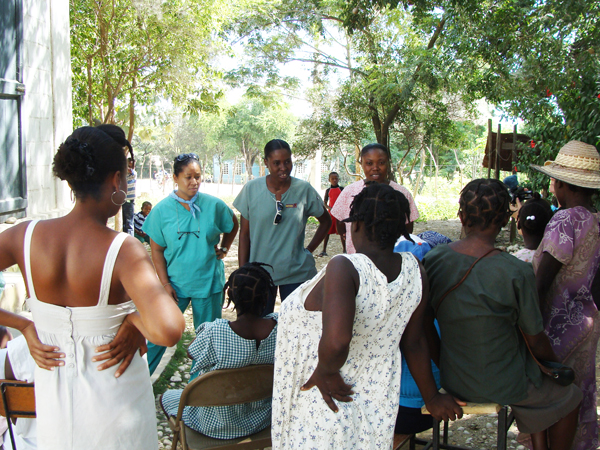Follow the University of Arkansas on Twitter @uarkansas.
FAYETTEVILLE, Ark. – University of Arkansas student Kelly Toner began going on missionary trips when she was 14. She found a new outlet for her passion to help people in other countries when she began planning her Honors College research requirement.
Toner, a senior in the Eleanor Mann School of Nursing, is developing an online volunteer orientation module for Midwives for Haiti. A short documentary film describing the work by the organization based in Richmond, Va., will be screened at 6 p.m. Tuesday, Sept. 20, in the Walker Community Room at the Fayetteville Public Library. Toner will speak after the screening about her work with Midwives for Haiti.
"I want to be a medical missionary," Toner said. "That's my passion. When I was deciding on an honors project, my faculty members said it would be hard to do a project I wasn't passionate about. They asked me questions about what I love, and they told me about Midwives for Haiti. I see myself doing this kind of work in the future."
Cara Osborne, assistant professor of nursing and Toner's adviser, will also speak. Osborne is a technical adviser for Midwives for Haiti and has traveled to the impoverished Caribbean nation several times to work. Midwives for Haiti educates Haitian women to provide prenatal care and skilled birth assistance to other Haitian women. The goal is to lower the number of mothers and babies who die during childbirth in Haiti.
Haiti has the highest rates of infant, under-5 and maternal mortality in the Western hemisphere, according to UNICEF.
Toner is a member of the 2008 class of Honors College Fellows at the university. The Honors College Fellowships are $50,000 over four years per student.
Midwives for Haiti makes a much larger impact by operating on an "accompaniment model" in which the organization trains women in the country to care for other women than if it sent medical volunteers to deliver babies a few times a year, Osborne explained. It's the sustainable model of humanitarian work that impressed Toner.
"If Midwives for Haiti ceased to exist, the program would continue to have an effect because the skilled birth attendants trained by us can train other women," Toner said. "Since I was 14, I've been going on mission trips where we went into countries and gave handouts. Then, between my freshman and sophomore years here, I studied in Spain and learned from some missions there that they don't want groups to come because they dump things and the missions can't continue supplying the needs after they leave. That's not helpful.
"I love the fact that the humanitarian efforts by Midwives for Haiti are sustainable," she continued. "We are helping people help themselves."
Osborne saw babies and mothers die while she was in Haiti on two trips last year. Although the first trip was less than three months after the 7.0 magnitude earthquake in January 2010, Osborne said the conditions she saw were not caused by the catastrophe. The government-based hospital in a rural area where she worked has no electricity and no running water, she said, and patients' families must bring them food and water.
"Deaths of mothers and babies in Haiti are commonly due to postpartum hemorrhage, obstructed labor and pre-eclampsia," according to Osborne. "These are not conditions somebody should die from. Obstructed labor is not even typically considered an emergency here in the United States because we have ready access to cesarean section."
In addition to developing the online volunteer orientation module for the organization, Toner is also creating a pilot study with 20 volunteers who are going to Haiti. They will evaluate the training module. Toner worked with Barbara Floyd, a midwife in Portland, Ore. Floyd evaluated the Midwives for Haiti program for her research to obtain a Doctor of Nursing Practice degree at the University of Portland.
Later this month, Toner will attend a staff retreat in Richmond to meet the people she has been working with at Midwives for Haiti.
"I can show them what I'm doing and take suggestions," she said. "I'm blessed to work with an organization that is sustainable in helping people. That's hard to come by."
Topics
Contacts
Cara Osborne, assistant professor of nursing
Eleanor Mann School of Nursing
479-575-5770,
Heidi Wells, content writer and strategist
Global Campus
479-879-8760,
